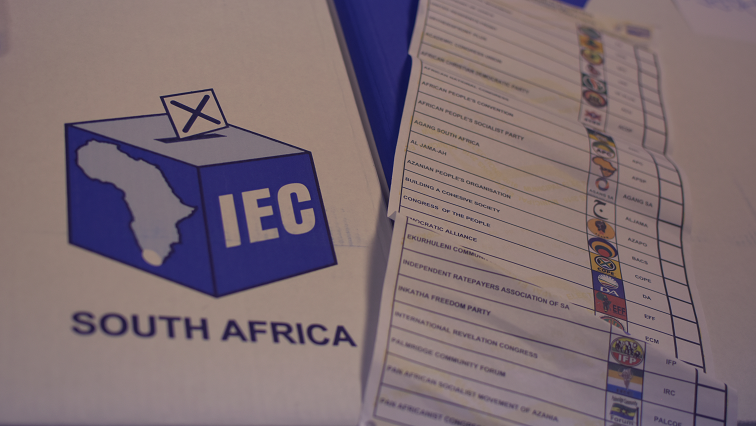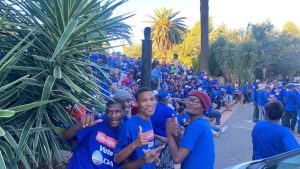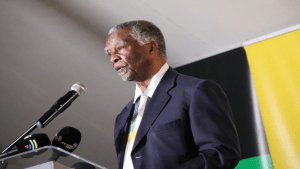Opinion – Ismail Lagardien
The ANC’s most significant achievement over the past 25 years has been to prevent a civil war, but with the election around the corner, the idea of an immediate post-election palace coup has started spreading beyond dinner table mutterings.
There is a straight line storm building up on South Africa’s political landscape that could bring significant political, economic and social damage during these days and weeks before the sixth general election of the democratic era. The election itself, if it is clean and fair, and if there are no challenges to the results, may turn out to be a watershed in the political economy of the democratic era. Of course, we could have said that about any of the preceding four elections since 1994 as each was a measure of the country’s democratic maturity.
This time may really be different, however. For the first time in the democratic era there are somewhat viable threats to the ruling African National Congress from the left and the right.
Whereas the ANC have historically represented the aspirations of Africans, and of black people, in general, there have emerged more vocal populist movements, like the Economic Freedom Fighters (EFF), the Black First Land First (BLF), who would insist that they are the rightful leaders of the African majority. As a black or Africanist leftist force, the EFF and BLF join other “black” or Africanist organisations like the Azanian People’s Organisation (Azapo) and the Pan Africanist Congress of Azania (PAC).
Among the main elements of the populist approach is identification of non-African land-owners, and of “monopoly capital” – all of which have antecedents early European settlement, Dutch and British colonialism, settler colonialism and apartheid.
Whereas almost all of these claims are politically and historically verifiable facts, the populist response has drifted towards the politics of revenge, and an almost biblical sense of punishment, where today’s white people should be punished for the sins of their fathers, those early generations of European and settler colonialists.
This is a rather crude and populist interpretation of the Constitutional obligation to roll back injustice of the past.
To the right of the ruling party, there are the Democratic Alliance and a smattering of small parties ranging from disaffected former ANC members (mainly Cope and the United Democratic Movement). While the right flank has implicit power, in terms of numbers, to unseat the ANC, it is the left that provide the force driving the straight line storm that is approaching South Africa.
The Leftist Challenge Taking to the streets
The outcome of next month’s election could go a long way towards changing South Africa in ways that are at once more dramatic than the period after 1994. There are at least two decisive factors. The first of these is if the left, mainly the EFF and BLF, accept the outcome of the result, should they not get the results they wanted.
The EFF have presented themselves as the government in waiting. During the hustings they have presented their leader, Julius Malema, as the next president of South Africa. Should this not materialise – if they EFF receive, say, less than 20% of the vote, which is conceivable – there is every possibility that the movement would grind the immediate post-election period to a halt. What of the BLF?
They made it clear that they were prepared to go to the mattresses to secure their goals? The BLF have shown that they can be a disruptive force – not in the creative, progressive sense, or as a positive source of political contribution towards a more stable and cohesive future. Based on recent evidence of recent public confrontations, it is not difficult to reach the conclusion that (together) the EFF and BLF can provide a catalyst for violence.
In short, a combination of EFF para-militarism (from the symbolism of “fighters” and “commanders” to an actual paramilitary force), Malema has long held the position that the flow of blood may be inevitable “as long as that blood delivers what belongs [land] to us we are prepared to go to that extent”.
Palace coup will reset the balance of power
There are, also, factions within the ANC that could destabilise whatever emerges from the election. Should the ANC receive less than, say, 55% in the poll, it may be viewed, by the restive factions, as failure on the part of Cyril Ramaphosa.
Already there is speculation, no more than that, that the ANC caucus may prevent a vote for Ramaphosa as President of the republic – assuming of course that the movement win the general election – and thereby prompting a palace coup.
This scenario is playing out in the eye of the straight line storm that seems to be gaining momentum. We should, of course, not be conspiratorial about these things, but the idea of an immediate post-election palace coup has started spreading beyond dinner table mutterings.
The first signs of Ramaphosa’s tenuous leadership of the ruling party were apparent at Nasrec, where he narrowly beat the Zuma-faction’s candidate, Nkosazana Dlamini-Zuma to the ANC’s presidency.
The idea spread when the courts ruled, in February this year, that Supra Mahumapelo should be reinstated as the ANC’s North West provincial leader, overturning the movement’s National Executive Committee decision to disband his provincial executive committee.
Mahumapelo is part of the so-called premier league comprising some of the ANC’s provincial premiers that include the former premier of the Free State, Ace Magashule, the movement’s current secretary general.
Magashule’s relative power, and the toxic nature of his support within the ANC was on full display after the publication of Gangster State: Unravelling State Magashule’s Web of Capture, and resulted in the destruction of books and property. What we have, then, are a faction in the ANC that have relative power – possibly still smarting over a loss at Nasrec – with rising sounds of a palace coup to replace Ramaphosa.
Should this occur, there is every possibility that a pro-Zuma faction, comprising the so-called Premier League, could take control of the presidency, the government and the country. This would place the ruling elite in confrontation with almost everyone else – except, perhaps, the BLF, who may remain in the Zuma camp if there is money to be made or if there are propaganda gains to be had.
A Turn to Rupture over Continuity
Almost every occasion of mass transformation includes a trade-off between rupture and continuity, between disruption and stability. The ANC’s most significant achievement over the past 25 years has been to prevent a civil war with an attendant descent into tribalism, large-scale racial clashes, general social instability and despotism – those markers of so many post-independence African countries.
These held until the period after Jacob Zuma took control of the party, and when his wrecking ball swung hither and thither, and the ANC’s cadre deployment began to represent a feeding trough more fully than ever before.
Until about 2009, Malema was still in the ANC, there was little or no evidence of the Premier League, the BLF and EFF were unborn, leftist and ersatz leftist formations like Azapo and the PAC were political non-entities, Irwin Jim was the General Secretary of the National Union of Metalworkers and firmly part of the ANC’s ruling alliance.
Jim has since established the Socialist Revolutionary Workers Party (SRWP), a radical anti-ANC formation. We may reach a point, in the coming days and weeks, and possibly the period immediately after the election when between them – the SRWP, EFF, BLF, Azapo, the PAC and the pro-Zuma faction in the ANC – change the dynamic of South African politics in ways that we have not seen in 25 years of democracy. Should they achieve any of the aims alluded to above (removal of Ramaphosa, a rapid rise in the politics of revenge, and a turn to crude identity politics as part of an almost biblical politics of punishment), South Africa may change quite dramatically after next month.
Whereas the ANC chose continuity and stability over rupture in the preceding period, next month’s poll may be a watershed, and South Africans may have to face rupture – in place of the gradualism and continuity of the past 25 years. The next election may, after all, be different to any other over the democratic period.






